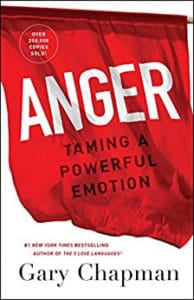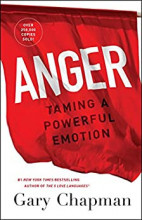
The War of Words
In this Adventures in Odyssey drama, a carelessly uttered word from Eugene creates havoc as it becomes the fashionable insult, resulting in a lesson about the power of words.
Home » Episodes » Focus on the Family Broadcast » Controlling Anger So It Doesn’t Control You (Part 2 of 2)
Excerpt:
Dr. Gary Chapman: I never really remember getting very angry until I got married.
(LAUGHTER)
Jim Daly: Okay, all the guys just, like us, started laughing. Now women are laughing, too, ‘cause that applies to them, but, uh…
Gary: And I … and I never remember getting super, super angry until I had a teenage son.
End of Excerpt
John Fuller: Dr. Gary Chapman is back with us today on Focus on the Family as we talk about a very powerful emotion: anger. Your host is Focus president and author Jim Daly and I’m John Fuller.
Jim: John, we laughed a lot on our program last time, which is ironic, given the topic. But so much of it is hitting home, right? (Laughter)
John: It really is. Yeah.
Jim: Well, I appreciate everyone’s transparency in that. We in the Christian community tend to want to put a lid on anger, because we don’t see it as a Godly emotion and it’s not if it’s out of control. But God got angry and does get angry. We call it “righteous anger”, right? He just says, know how to manage your anger. And our guest did such a good job giving us tools last time, so we can better manage our anger in our marriages and in our parenting. Probably the two flashpoints in our relationships. And we’re going to continue that discussion today.
John: Yeah, Dr. Gary Chapman has been a favorite guest here at Focus on the Family for a number of years. He’s a very well-known author, speaker, and counselor. His insights are captured in the book that we’ve been talking about. It’s called Anger: Taming a Powerful Emotion. Get a copy and a CD or download from the last conversation at focusonthefamily.com/broadcast. Or call 800, the letter A and the word FAMILY. And let’s go ahead now and rejoin part two of that conversation.
Jim: Gary, welcome back to the program.
Gary: Thank you, Jim and John. Good to be with you again.
Jim: You know, when you look broadly at the difficulty that marriage seems to be in today and if I could be blunt, even within the Christian community. Too many marriages are ending. I think a lot of it, and you would know this being a counselor, it really is being caused by our lack of ability to communicate, to understand each other, to hear each other and we covered those topics last time. In fact, we talked about last time the six steps of dealing with anger toward your spouse and we have that posted at the website, so again, go there to look at that, because I think it really does help you understand better that emotion inside you that sometimes feels out of control. Let’s pick up where we left off last time. In your book you talked about distorted anger and definitive anger. What’s the difference?
Gary: I think it’s important, Jim, to recognize there is a difference. There’s two kinds of anger. God only has one kind of anger. It’s always righteous anger, because God is holy. We have two kinds of anger, because we’re not holy. We’re sinners. We have definitive anger, which a wrong has been committed. We should be angry. God is angry when a wrong is committed, so we should be angry if someone sins against us or if we see them sinning against someone else. It should stimulate anger and I believe the purpose of that kind of anger is to motivate us to deal with the issue. You know, Jim, all great social reform was born out of anger.
Jim: Huh.
Gary: Look at the slavery movement in this country. When did it finally stop? When Wilberforce in England and folks here in this country got angry enough and said, “This is not right.” And they took steps. It took a while, but they took steps to bring the end of that chapter in our country. So, all great social reform is born out of anger. And I think on the individual basis, when someone wrongs us, we should be angry, and Jesus is clear. He says, “When your brother wrongs you, when he sins against you, you go to your brother. You share it with him and if he repents,” He says, “you forgive him.” So, the purpose of that kind of anger, definitive anger, is to motivate us to talk to the person who wronged us and seek to deal with the issue and resolve the issue. On the other hand, we have what I call distorted anger. You know, Satan has taken every gift of God and distorted it and here he distorts anger, so that a lot of our anger falls in this category, which means, we get angry not because someone sinned against us, but we get angry because they didn’t do what we wanted them to do or they didn’t do it on our timetable in a marriage.
Jim: Well, it’s epidemic in our culture.
Gary: Absolutely, you know, and I experienced that. You experienced that. You know, my anger in the early days, one of them was the way my wife loaded a dishwasher, you know. Irritated me to death. I got angry with her.
Jim: Why?
Gary: Because she didn’t load it in an organized fashion. You know?
(LAUGHTER)
John: Everything’s just thrown in there.
Gary: Yeah. Yeah. She – she…
Jim: I could relate a bit to that.
Gary: …She loaded the dishwasher like she was playing frisbee, I mean, you know. And it just irritated me to death. Well, I’m asking you, did she sin against me? No, no. I sinned against her by yelling at her, you know. But so, my anger was distorted anger, because she didn’t sin against me. She just didn’t do it the way I thought she oughta do it and in the family, a lot of our anger falls into this category.
Jim: Gary, I mean, what you’re saying there is so profound, and we need to drill into that, because that applies not only in our marriages, think of the churches that have split because of colors or you know, whatever. It’s that kind of distorted anger that we’re talking about.
Gary: Much of our anger falls into this category and that’s true with our spouses, with our teenagers, with our children, with our – even with our friends, you know. And so, what I say is this, we have to handle those two angers in a different way. When we have distorted anger, again we’re gonna count to 100, okay. And while we’re taking that walk, counting to 100, we’re gonna ask ourselves, did they sin against me? And if I realize, no, it wasn’t a sin, then God and I can deal with that on the other side of the block while I’m counting. You know, I can say, “God, forgive me, that I’m so self-centered that I got so upset over something like that.”
Jim: Huh.
Gary: I’m selfish and I can confess that to God. Now it doesn’t mean that I don’t go back and talk to my wife about it. You know, I may go back and say, “Honey, when you’ve got a chance, I want to talk to you about something.” You know, and I can – we can talk about the dishwasher, okay, which we did eventually. We talked about the dishwasher and finally, she agreed that it would be fine for me to load the dishwasher.
(LAUGHTER)
Jim: I was going to say – I was going – Which in that suggestion, you may want to load it yourself.
(LAUGHTER)
John: Oh, that’s good.
Gary: So, it’s fine to deal with those irritations, but don’t assume that you’re right and they’re wrong on all those points.
Jim: Well, and I love that litmus test to say, has this person sinned against me…
Gary: Yeah.
Jim: …As the bucket-clearing approach, ‘cause then you know which bucket to put it in.
Gary: Yeah, absolutely.
Jim: And then you can deal with it. Let’s talk about that frustration. You talked about it last time, that marriage brought out anger in you, but being a parent brought out super anger in you. Why is that? Why can kids so efficiently and effectively figure out those hot buttons to push.
Gary: (Laughing) Well, I think as parents, we want to be good parents. I mean, really, we really want to be good parents. And so, we teach our children certain things and when those children violate those things that we’ve taught them, then we get angry with the child. And if we have never learned how to handle our own anger, we are likely to lash out at our child and with harsh words and loud words and then our children go away feeling hurt, because we have lashed out at them. The person that they love the most, respect the most, has just lashed out and told them how stupid they are or, “I can’t count on you,” or you know, all these things we end up saying when we’re angry.
Jim: And you can say that in a lot of different ways.
Gary: You can, yes. And so, you know, it creates a tension between the parent and the child and that’s why I say to parents, “Don’t expect your children to handle anger better than you.” I remember the 13-year-old in my office who said, “My father yells and screams at me, telling me to stop yelling and screaming at him,” you know.
Jim: (Laughter) I’ve thought about that.
Gary: So, you know, I think as parents, most of us need to recognize we need help in handling our own anger. And we’re not gonna teach our children how to handle anger unless we also learn with them how to handle anger. And I’m – and that means apologizing to your child. And some parents say, “Well, I don’t want to apologize to my kid. I mean, they don’t – they won’t respect me.” They will respect you more. They already know what you did was wrong. (Laughing) And when you say, “Honey, I’m sorry I yelled at you. A mother should never yell at her child. A father should never yell at a child. And I was wrong, and I want to ask you to forgive me,” you’re – you’re also teaching them how to apologize for their failures. But once we begin to acknowledge that, then I think we can teach our children how to handle anger. And what we want to learn in a family is how to sit down and talk when you’re angry and listen to the person that’s angry. The one that has the anger is the one you need to be listening to, because you can’t process it with a child if you don’t listen to them. See, sometimes our children come to us and they’re angry with us and they’re raising their voice at us and yelling at us and we often – parents often say, “Shut up and go to your room. You’re not gonna talk to me that way. You gotta respect me.” Well, the child goes to the room, but they don’t respect you and you’ve pushed the anger inside. Far better, even if your teenager is yelling at you, far better to hear your teenager and say when they tell you, “Now let me make sure I’ve got this. You’re angry because … da, da, da, da da.” And they say, “Well, that’s part of it.” And so, you listen again. You listen and you listen, and you listen to that teenager, so you understand why they are angry. And then you can say, “You know, son, I understand what you’re saying.”
Jim: Well, practically speaking, what you’re doing there is a release valve for their anger. You’re de-escalating…
Gary: Yes.
Jim: …Their anger…
Gary: Yes.
Jim: …Which is brilliant and it’s mature. That what you’re helping.
Gary: And – and you’re learning – you’re learning the heart of why they’re angry.
Jim: Right, which is…
Gary: You know?
Jim: …Important.
Gary: And if you put yourself in their teenager’s shoes, you can say, “Son, if I were you, I’d probably be angry, too.”
Jim: No, I like that.
Gary: “Now – now let me tell you why I’m not gonna let you go to that party.” Now you give your perspective, okay and because you’ve heard them, they’re far more likely to hear you.
Jim: Gary, talk about temperament. You, of course, have written The Five Love Languages, which is a brilliant way of understanding human behavior, but temperament plays into this, as well. You know, you can be in that parenting role. I’m a little more laid back. You talk about that in the book. You’re somewhat like that. The spouse, whether that’s a husband or a wife, the spouse being typically opposites attracting, they may be a little more rigid and a little more black and white. Talk about how, in your marriage and in your parenting, you can do better understanding each other in that area of personality.
Gary: Yeah, I do think personality patterns affect the way we respond to anger and the way we respond to our children’s anger. And this causes the parent who’s laid back to hurt when they hear the other parent kinda lashing out at the child. You know, they’re – they’re just, “Oh, man, that’s striking right at the heart of my baby,” you know. And so, it can cause tension in the marriage. That’s why I really encourage families to about once a month have a family conference. Sit down and take an hour and say, “We’re gonna talk about us. How are we doing as a family?” And give the children a chance and give mom and dad a chance, everybody a chance…
Jim: Hmm.
Gary: …To share how we feel like we’re doing as a family. And “What is – what is it about our family that you would like to see improved? Let’s – let’s share one thing that might make our family better.” Man, this has tremendous potential…
Jim: That’s a great idea.
Gary: …You know, to do that once a month and maybe some months you won’t need by 30 minutes but give an hour every month. I believe we could see families really changing if you’re listening to teenagers make suggestions and dad make suggestions and mom and we’re all gonna try to do this better this month.
John: And this reminder, we’re talking with Dr. Gary Chapman about his book, Anger: Taming a Powerful Emotion and it has a big, red flag on the cover and advice for you to be able to recognize those red flags of anger in your life so you can take preventive and even proactive steps in your relationships, especially your marriage. We’ve got that book and an Anger Quiz that we’re going to link over to at focusonthefamily.com/broadcast. Let’s go ahead and rejoin our conversation with Dr. Gary Chapman.
Jim: Gary, let’s in the next few minutes – let’s talk about that anger that we have toward God. We’ve talked about it in the marriage context, in the parenting context. Some people are angry with God. They may not even realize it. Maybe something has happened in their life and they have held resentment there. It didn’t go the way that they thought it should go. And this is kind of awakening or stirring this acknowledgment that I have been angry with God. First of all, is it okay to be angry with God?
Gary: I think, Jim, we are sometimes angry with God and you’re not gonna hurt God by telling Him that you’re angry.
Jim: He loves truth.
Gary: (Laughing) He loves truth. And I think this happens most often, Jim, when let’s say you have a family member that’s seriously ill and you prayed that God would heal them and you really trusted God and believed God was gonna heal them and then they died and they’re only 35. You know, and you just think, “God, why did You do this to me? You know, I’ve tried to live for You and walk with You.” And that’s just one example, but there are a lot of things we pray for and God doesn’t do what we think He oughta do. And so, we do have anger toward God. We may not call it anger, but we feel like God has done us wrong and this is what stimulates anger, the sense that I’ve been wronged.
And I think the Biblical example is you just tell God. You know, Jonah got angry with God after the people repented. He got angry with God because he said, “You made me look like a fool.” You know, “I said You were gonna destroy the city and now You’re not gonna destroy the city.” (Laughing) And – and God listened to Jonah and basically said, “Jonah, you’re a success, man.“
(LAUGHTER)
Jim: Right.
Gary: “That was the whole purpose of your preaching, you know.”
Jim: Put a smile on your face.
Gary: Yeah. And, uh – uh, Caine got angry with God over the fact that God accepted his brother’s sacrifice and not his. So, the Bible has many examples of people being angry with God. Even Job, you know, we think of him as being patient, but Job expressed some anger toward God, and you read the book again. And I think we – we share our anger with God. We just tell God how disappointed and how hurt, how angry we are and – and in that context, you listen to the still small voice of God and chances are, you will hear in whatever language communicates to you, “I hear you. I understand. If I were in your shoes, I’d be angry, too. But you know, there’s some things you don’t know. There’s some things you don’t know. You know, My ways are higher than your ways.” And you – you’ll receive the peace of God.
Jim: Well, what’s fascinating about that in that relationship with the Lord, it’s very much like that marriage. I mean, if you’re not communicating honestly, it’s not gonna move forward.
Gary: Yeah.
Jim: And your relationship with God is similar. I mean, it’s not that complicated.
Gary: Yeah, you’re right.
Jim: And if you’re not honest with Him, you’re not hearing His voice, you’re not doing the things that we’ve talked about, God can’t penetrate your hard heart either, can He?
Gary: Yeah. I think sometimes it takes tragedy or something, you know, to wake us up, you know, and say, “Oh, yeah, where have I been?” Listen, don’t walk away from God when you’re angry with God, because to walk away from God is to walk away from the only real help you have. So, I encourage people. Share your anger with God. That’s right. But you stick with God, because He’s your only hope ultimately.
Jim: In the book you stated something that really grabbed me. You said, often the stronger one’s faith is, their Christian commitment, the more intense the person’s anger can be toward God. That seems counterintuitive.
Gary: Yeah. Yeah.
Jim: Why do you find that collaboration, that the greater our faith in God, typically the greater our anger can be with God?
Gary: I think because there’s a sense in which we – we have bought into this idea that if I’m really faithful to God, if I’m 100 percent sold out to God, then God’s gonna answer my prayer.
Jim: Can we say that a little differently? That He owes me.
Gary: Well, and yeah, that He owes me.
Jim: I mean, that hurts, but it’s…
Gary: Yeah.
Jim: …What we’re saying.
Gary: I – I think you’re right. I think you’re right. And I think that’s why I say that. You know, that those who are really strong in faith can also be very angry with God when He doesn’t do what they think they deserved.
Jim: Gary, I don’t want to let this go yet, because I think there are people who are really struggling. They have had the “fill in the blank.” It might be the prodigal child that went the wrong way and they’re still not living where they would like as a parent for that adult child to be living, maybe the teenager. It’s the spouse who’s upset me. That, uh, they’ve maybe had an affair. I don’t know. They do something that irritates me. It may be in the sin bucket and it’s legitimate for me to have anger. It may be in the distorted bucket that we talked about earlier, that it’s my issue, not their issue. How does that person whose had this anger toward God, toward their spouse, toward their child – how do they really practically today change the course of all those relationships for the better? That they’re feeling something in their heart. They know what you’re saying is true and right, but “I feel like the – the ladder’s just out of my reach to climb out of this dark pit.”
Gary: Yeah.
Jim: How do they actually get ahold of the ladder today?
Gary: I think the first thing I would say is, if they’re really, really, really down, really depressed, really in the pit, I would call a pastor or a counselor and say, “I need to talk to somebody.” God uses people to help people and I would reach out and talk to someone. I think that’s – because our relationship with God is first. We’ve gotta get this thing with God going. Then we can reach out and try to talk to the people that have hurt us, because it’s a twofold anger. We’re angry with the person that did this and we’re angry with God. But I believe we all need help and I think talking to one of God’s children that you trust will give you real help.
John: Mm hmm. But Gary, what if I want to talk to that person, but they’re angry at me and they don’t want anything to do with it?
Gary: I think what we do then is, we release the person and we release our anger to God. You see, many people have held anger inside for so long that they now overreact to little things, because they’ve got stored anger inside. And what I encourage people to do is, to make a list of all the things where people have wronged you in the past and then sit down with God and say, “Lord, You know what my mother did. You know what my father did. You know what my brother did. Here they are and they’ve never confessed. They’ve never repented, and they act like it’s all right. I’ve held this anger for years. I want to turn it over to You and I want to release them to You, knowing that You are loving and just. If they repent, You will forgive them and so will I. If they don’t, You will bring judgment on them. I’m turning them over to You.” And you release that anger, release those people to God. Now you’re free to live your life.
Jim: Gary, can I press you? The application when it comes to our marriages and our children is self-evident. These are the people that live the closest to us obviously. They’re the people that know how to push our buttons. (Chuckling) And then our relationship with God that we understand that He knows us better than anyone and to be honest with Him. I’m grabbing all that. I understand that. Talk about our neighbors and our friends in the culture at large, how this applies in that context. ‘Cause we can kinda look the other way with that. That neighbor drives me crazy…
Gary: Yeah.
Jim: …And we don’t deal with that. Talk about that next ring out and how we need to recognize it and how we deal with the world. For example, you talked about how believers need to go to each other. How do we go to the world when it offends us, a person that doesn’t know God and they’ve done something that really hurts us? How do you deal with them? Is it different than dealing with a brother or sister in Christ?
Gary: You know, I think it’s twofold with friends or neighbors. One is, sometimes we get angry with them because of things they do. Sometimes they get angry with us. I remember my next door neighbor right after I moved in, I had a group of people come over from our church and clear out my backyard and the next day, my neighbor, whom I’d never met, came over and knocked on my door and he said, “Those people you had out here, yesterday, they cut my tree down.”
Jim: Right.
Gary: I said, “Really?” And I – I said, “Well, show me. You know, let me go see it.” And I went back there, and it was a little tree, not as big as my finger, you know. They thought it was a weed and they cut it down. They cut his tree down. You know, and he was angry, and he was, you know, lifting his voice at me. And he said, “You tell that company, they’re gonna have to pay for my tree.” And I said, “Really, it wasn’t a company. It was people from my church that came out and did that.” I said, “But I’ll be glad to replace the tree.” I said, “What kind of tree was it?” And he told me. I said, “Well, I – I will see that that gets replaced,” you know. So, I think if people are angry with us and neighbors sometimes are, ‘cause our dog gets in their flowers, too, you know.
(LAUGHTER)
Jim: Yeah, right.
Gary: We need to listen to them, and we need to do everything we can to make restitution with that person. But sometimes we also get irritated with neighbors or with friends, you know. And I think, you know, with real friends, it’s easier to say, “You know, Jim, what you said last night really hurt me and I want to talk with you about it.” Now if you’re real friends, not acquaintances. I’m talking about real friends. Real friends can confront each other and – and get it cleared up quickly most of the time.
But it’s those acquaintances, those people at work and those people in the neighborhood that you’re just acquainted with, but you’re not really close friends with that are sometimes more difficult. But I do think often our going to them and talking about something, if we – if we’re angry about something, going to talk with them about it opens the possibility of having a conversation with them later on, you know.
Jim: Well, it’d be different than what they encounter typically.
Gary: That’s right.
Jim: So, if you’re open…
Gary: That’s right.
Jim: …And honest and…
Gary: Yeah.
Jim: …Willing to hear them and…
Gary: Yeah.
Jim: …I mean, in many ways, the reason I guess I was leading with the question, because so often in the cultural discussions we have, we treat people that don’t believe the way we believe very harshly.
Gary: Yeah.
Jim: And – and we’re expecting some result from them that is different than what they’re capable of providing. And it – it’s a good lesson for us to treat them with deference, with respect…
Gary: Yeah.
Jim: …Even though they may support things or believe in things that are abhorrent to us as Christians.
Gary: Yeah.
Jim: Um, but we still need to create a mechanism, which to me, is Godly character.
Gary: Yeah.
Jim: He created us. He knows the mechanism, so by using the principles that you’ve described in our marriages, in our childrearing, in our relationship with God and then applying them to the unbeliever, is equally as important.
Gary: I think so and I think it’s the only way to build authentic relationships and to build respect with each other. You know, you’re saying to a neighbor, “I want to be honest with you. I want to share something with you and maybe I’m reading this whole thing wrongly.” You know, you’re not going with a axe; you’re going with a open heart and you’re just trying to clarify it, because “I want us to have a good relationship.”
Jim: That’s tough stuff, but it’s right.
Gary: Yeah and I think also going and apologizing to people that you wrong. I remember once, I got – I got into it with a – my bank teller. (Laughter) You know, I…
Jim: Now we’re getting’ to it.
Gary: …I – I took my statement down there and I said, “This is not right,” you know. And she looked at it and she didn’t understand it and I explained it again. I explained it about three times and got a little louder and then I just said, “Well, just forget it” and I walked out. And I got back to my office and I thought, “I can’t go up there and help people this morning and listen to…”
Jim: (Laughter) You didn’t feel very good about it.
Gary: “…people and their problems.” Yeah and I – and I just knew I had to go back down there and apologize to that lady and I went back down there, and I said – and I was hoping she didn’t know who I was.
Jim: (Laughter) Right. That’s the other part.
Gary: But I – but I – I said – I said, “I’ve come back to apologize,” I said, “because I lost my temper with you and I spoke to you harshly.” And I said, “I’m sorry and I want to ask you to forgive me.” And she said, “Oh, Dr. Chapman,” she said, “we all lose our temper once in a while.”
(LAUGHTER)
Jim: Oh, man. Well, that’s a better evening conversation that she’s gonna have though, because…
Gary: Yeah.
Jim: …She would’ve been sitting at dinner that night with her husband saying, “You wouldn’t believe…”
Gary: Yeah.
Jim: “…That Dr. Gary Chapman came in and chewed me out.”
Gary: Yeah. And we became friends after that, you know. So, sometimes apologizing for your own anger towards somebody that’s not a Christian opens up a door for friendship.
Jim: Well, and again, that’s a great example of what we need to do in all facets of our lives. That’s the Christian way…
Gary: Yeah.
Jim: …And the Godly way. So, Gary, it has been so good to have you with us. Thanks for coming. Thanks for writing this book, Anger: Taming a Powerful Emotion. You have taught me a lot today. Thank you.
Gary: Well, thank you, Jim.
John: Some really great reminders today from Dr. Gary Chapman, especially in light of the current situation with the pandemic.
Jim: Yeah, it’s true, John. These past few months have been full of emotional ups and downs, and I know that’s caused things like anger, anxiety, and relationship tension for many people. And we’re hearing from you and connecting you with our caring, Christian counselors. So, if you’re in that spot, do call us. Recently, we heard from a pastor who felt depressed and angry about the effects of the pandemic on his congregation and we were able to connect him with one of our counselors, who helped this man, this pastor, find the root of his emotions and take steps to feel closer to God and really calm down which is the point.
John: Yeah and that’s such a great aspect of the ministry here at Focus. That team of counselors and, uh, all of the help that they offer. You can get in touch with one of our counselors by calling 800, the letter A and the word FAMILY. We’ll schedule a time for them to call you back. Or there’s a counseling request form you can fill out at focusonthefamily.com/broadcast.
Jim: And I want to emphasize that it’s you, our financial supporters and prayer partners, who make those free counseling consultations possible and free to those who are hurting. Our support team plays a crucial role in giving hope to people, like that pastor, who often feel like they have nowhere else to turn. And I know many of you have been financially impacted by the pandemic as well and we absolutely understand that. But we are now facing a bit of a shortfall in our budget. So, if you’re able and maybe you’ve been listening to the podcast or the broadcast for some time and haven’t really thought about supporting us, now is the time. We need to hear from everybody so that we can continue to do the things that we need to do. In fact, we have some faithful friends who have put up a matching gift opportunity that’s going to double what you give today. So, if you give $5 it’s 10 and if you give 25 it’s 50 and so on. So, we’re grateful to both those matching gift friends and you for taking up the challenge.
John: Yeah, do so by getting in touch with us. And if you can join the support team in any way today, even just small gift, we’re going to say thank you by sending a copy of Dr. Gary Chapman’s book, Anger: Taming a Powerful Emotion. Again, the website where you can donate and get the book is focusonthefamily.com/broadcast. Or give us a call 1-800, the letter A and the word FAMILY. Be sure to join us next time as we talk about finding hope when things feel hopeless as one woman shares her story of losing her husband.
Teaser:
Mrs. Tricia Lott Williford: I had nothing to say to God. I felt abandoned. I felt forgotten. I felt overlooked. And I remember saying, “What made You think this was a good idea?”
End of Teaser
John: On behalf of Jim Daly and the entire team, thanks for listening to Focus on the Family. I’m John Fuller inviting you back as we once more help you and your family thrive in Christ.

Dr. Gary Chapman is the senior associate pastor at Calvary Baptist Church in Winston-Salem, N.C. He’s also an international public speaker and the best-selling author of numerous books including The Five Love Languages which has sold more than sevenmillion copies and has been translated into nearly 40 languages. Dr. Chapman holds several academic degrees including a Ph.D. in adult education from Southwestern Baptist Theological Seminary. He and his wife, Karolyn, have been married for over 50 years and have two grown children.

Receive Gary Chapman's book Anger: Taming a Powerful Emotion for your donation of any amount!

Focus on the Family offers a one-time complimentary consultation from a Christian perspective.

Visit our online store and purchase a CD of today's program for yourself or to share with a friend.

Learn how you currently manage anger and how you can take steps to control it so that it doesn't control you.

Here are six steps you can take to deal with anger toward your spouse in a healthy and constructive way.

Strong emotions don’t have to threaten your marriage. Here’s how to minimize three unhealthy behaviors and the hurt that results from them. These godly principles can help you heal your marriage.

Learn how to recognize the reasons for anger, and whether it's appropriate or not.

Be aware of your own feelings. Notice when you are annoyed or overwhelmed and are becoming angry. Once you are aware, choose to take a break and deal with your emotions before you try to deal with your child’s emotions.

As more people are quarantined because of the coronavirus pandemic, authorities expect the number of domestic violence incidents to increase. Here's what you can do.

In this Adventures in Odyssey drama, a carelessly uttered word from Eugene creates havoc as it becomes the fashionable insult, resulting in a lesson about the power of words.

This discussion offers a preview of Volume #16 “Cultures in Conflict” from the That The World May Know video series, available below.

Debra Fileta will help couples better understand the four seasons of healthy relationships, what to expect during each one, and how to carefully navigate them for a stronger marriage. (Part 1 of 2)

Larnelle Harris shares stories about how God redeemed the dysfunctional past of his parents, the many African-American teachers who sacrificed their time and energy to give young men like himself a better future, and how his faithfulness to godly principles gave him greater opportunities and career success than anything else.

Amy Carroll shares how her perfectionism led to her being discontent in her marriage for over a decade, how she learned to find value in who Christ is, not in what she does, and practical ways everyone can accept the messiness of marriage and of life.

Jonathan McKee offers parents practical advice and encouragement in a discussion based on his book If I Had a Parenting Do Over: 7 Vital Changes I’d Make.